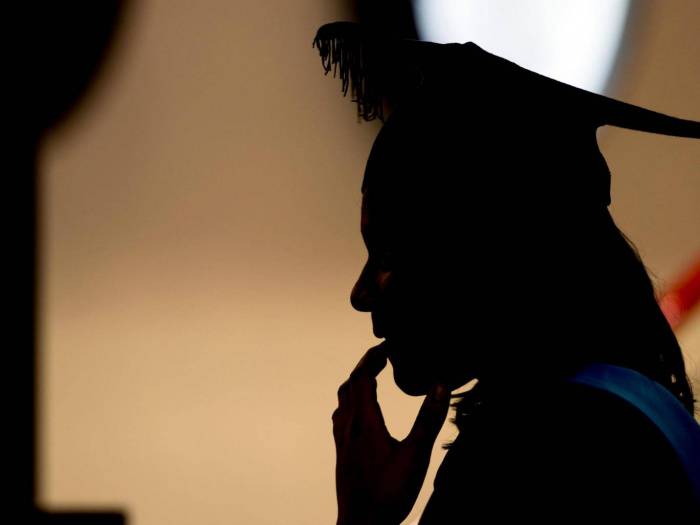The data, from the Ucas admissions service, has prompted accusations from Labour of “institutional racism” in the higher education system and demands for urgent action to stamp out “racial profiling”.
Ucas said it is “extremely concerned” by the figures, released under freedom of information rules, and has launched an investigation.
The data shows that 419 black British applicants to undergraduate courses last September were highlighted as a cause for concern, compared to 181 white British applicants, despite there being far fewer black applicants.
Figures show there were 42,580 black applicants, meaning that one in every 102 applications was investigated.
During the same period, there were 388,465 white British applicants, meaning just one in every 2,146 applications triggered further interrogation.
Ucas has insisted ethnicity is not taken into account during the screening of applications – even though prospective students declare their ethnicity in the forms they submit.
The figures come at a time when black students’ experiences of the higher education system have been in the spotlight.
Labour MP David Lammy revealed last year that 13 Oxford university colleges failed to make a single offer to black A-level applicantsover a six-year period.
There have also been a number of recent reports of racist incidents at universities. Last month, two 18-year-old males were arrested after a Nottingham Trent University student posted video footage of racist chants in her student halls. A black student captured two males chanting “We hate the blacks” outside her bedroom door.
Members of a student law society at the University of Exeter were suspended after private WhatsApp conversations containing racist comments were shared on social media.
And earlier this month, Sheffield Hallam University launched an investigation after a rotten banana was reportedly thrown at a black graduate student during an ice hockey match.
On the latest figures, Mr Lammy, the former Labour higher education minister, said: “Questions clearly have to be asked about what is behind this disproportionality within the Ucas verification system, and why applications made by black students are more likely to be flagged and investigated.
“The evidence suggests that unconscious bias may well be a factor.”
Angela Rayner, shadow education secretary, said: “This shocking practice highlights just how pervasive institutional racism is across the higher education sector. Ucas has been completely unable to justify this discriminatory practice.
“Ucas must urgently investigate this and make clear what steps will be taken to end the racial profiling of students.”
Fraud and similarity detection software, as well as input from universities, are used when deciding whether an application needs investigating. The process looks out for a variety of things – including fake qualifications, plagiarised personal statements and inaccurate information.
Since the findings have come to light Ucas has said it will publish data, showing the gender and race of applicants flagged, to the public annually – with the first figures expected next month.
The total number of applications cancelled after investigation is small. But these figures do not take into account applications that have been withdrawn by the prospective student themselves.
One prospective black student told The Independent that he decided to pull out of the application process after he found Ucas’s investigation to be “intimidating”.
Samuel Babarinde, who had his application flagged by Ucas during this academic year, said: “I have been very emotionally distressed by this whole process. I felt I had been singled out.
“It felt like I was already guilty before being found guilty. It was intimidating and frustrating.”
NUS black students officer Ilyas Nagdee said: “I am almost lost for words in being able to understand how something like that has been allowed to take place.
“And how a process – which many people thought of as just being the vehicle to university applications – is also fuelling prejudice.
“It will make a lot of people lose trust in Ucas, so they urgently have to take steps to rectify that.
Helen Thorne, external relations director at Ucas, said: “I am not aware of any way really that unconscious bias could creep into this. Our fraud and verification team have equality and diversity training as well.”
However, Ucas will be carrying out research to understand what is driving the higher figures – and the organisation expects to publish these findings in a report alongside the data.
Ms Thorne added: “If it shows that there is an issue – we don’t know today whether there is an issue – then we will also set out what we will do about it.”
She added: “We are extremely concerned about the data we pulled out in response to the freedom of information request. It is a matter of genuine concern for us and we want to get to the bottom of that. This is an area that we need to be more transparent.
“We take transparency very seriously here at Ucas. We have put in huge efforts in recent years – in terms of analysing and publishing admission data on applications, offers and acceptances by ethnicity – to really shine a light on what is happening in the admissions process.
“This is one of those areas that we really want to take further. We will now be publishing data on fraud and verification activities with a breakdown by applicant characteristics on an annual basis.”
A Department for Education spokesperson said: “We want to make sure that students have access to our world class universities, no matter what their background or race. And while we have seen record entry rates at universities across all ethnic groups, we recognise there is more to do.
“That is why we have already produced guidance asking the Office for Students to push universities, particularly those that are highly selective, to close the gap in access faster.
“The prime minister has also launched a race disparity audit and a programme of work to tackle disparities across all levels of society – including employment, education and criminal justice.”
More about: universityapplications
















































